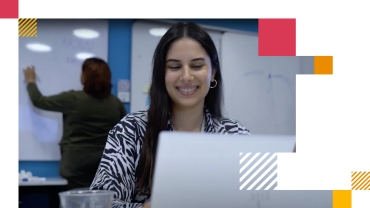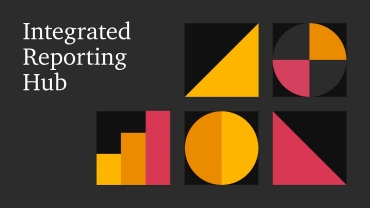
Transparency Report 2021 - Nicola Shield and Jon Walters transcript
I'm Nicola Shield, the Ethics Partner for the UK and I'm joined by Jon Walters, PwC UK’s Partner Responsible for Independence.
Ethics, and the principles of independence, objectivity and integrity are absolutely fundamental to our ability to deliver on the firm’s purpose, which is to build trust in society and solve important problems.
Being objective and independent in our work and performing it with integrity ensures we deliver high quality services, whether we are auditing financial statements, advising on a complex transaction, or supporting large transformation programmes.
For PwC, independence underpins objectivity. It is a fundamental component of our role as auditor, and is an area we take really really seriously. There’s two parts to it, there’s independence of mind, and there’s independence in appearance, and we make sure we consider each of those separately, and we seek to embrace both the spirit of the rules as well as the letter of the law.
This year we’ve invested a large amount of time and effort in training our people in the new FRC Ethical Standard. And we’ve enhanced both our central team, our systems, our processes and our controls. All with the aim of making sure that all of our people across the firm both understand and comply with, the rules.
Those rules include rules on personal independence, rules on non-audit services, rules related to the firm’s independence as well as rules covering any other type of relationship that PwC may have with an audited entity.
Yeah, and it’s obviously not just the rules and the guidance that we think about. At PwC, we really strive to do the right things, for society, for our clients, and for our people.
We have a code of conduct that sets out a common framework for everyone around how we are all expected to behave, do business and to do the right thing. This includes Speaking Up if we come across a situation that is inconsistent with the Code or our values.
We also think really carefully about the organisations that we work with, and consider a variety of factors before taking on new work. This includes considering some of the new areas of work which might arise, such as services for cryptocurrency which has been a new area, and assessing those risks really carefully.
And in that, we have really strong risk and quality governance and controls, which means that new work is appropriately considered.
We’ve also got the central team of dedicated subject matter experts who are are there to advise, support and help teams who are having to think about independence matters. That team is experienced and there to advice teams on how they think about independence, how they think about objectivity, how they consider conduct issues, as well as broader ethical areas.
And if you think about some of the examples of what that team has worked on recently and been involved with, that would include advising and considering whether we can help entities that we audit on acquisitions where they have a need for a reporting accountant. It would include advising audit engagement leaders on how they should think about the permissibility of non-audit services that are being provided elsewhere in PwC. That would include advising and helping to think about the potential risks of a conflict of interest, and have we got the right safeguards in place to really protect our objectivity and our independence.
Another really important area is the rules around partner and firm rotation, and the need to really think about how we manage the threats of familiarity. We have a separate team that deals with that within our Audit practice, but a key safeguard there is the rotation of partners and senior members of staff.
And then the final thing I think about is whenever we’re thinking about independence, we really make sure that we consider the perspective of the objective, reasonable and informed third party, and actually step back and think “well how would a third party think about this”?
And if the work is considered to have significant risks or relates to particularly sensitive or challenging circumstances, then we have the firm’s Client Committee, which is a sub-committee of the Clients and Markets Exec. That’s convened to consider engagements or client acceptance decisions that are particularly challenging. That includes assessing things such as commercial risk, objectivity, independence or even delivery risks.
For all work we do across the firm, the view of an objective reasonable informed third party is considered as part of that. For example that Client Committee considered the vaccine rollout work, and that was certainly discussed there.
And our views and our thinking, and joined up thinking around independence, objectivity, and integrity really makes sure that we are delivering high value and high quality to our clients, for our people and for society at large. Agreed.
Contact us













